LOS ANGELES — A long-running internal battle among ABC executives over creative control and future strategy led to the ouster on Wednesday of the network’s entertainment president and the elevation of a pair of his lieutenants.
Paul Lee, who found hits like “How to Get Away With Murder” and led an industrywide push toward more diverse casting, resigned under pressure. Channing Dungey, previously ABC’s drama chief, will take over the prime-time part of his job as the head of ABC entertainment, making her the first black network president.
Ms. Dungey’s elevation is a breakthrough for an industry that has often struggled with diversity, especially among the senior executive ranks.
“Channing is a gifted leader and a proven magnet for top creative talent, with an impressive record of developing compelling, breakthrough programming,” Ben Sherwood, president of the Disney-ABC Television Group, said in a news release. Ms. Dungey, 46, who has worked on series like “Scandal” and “Once Upon a Time,” said she was “thrilled and humbled,” adding that Mr. Lee was “a valued mentor and friend.”
Patrick Moran, the executive vice president of ABC Studios, will take over Mr. Lee’s duties there and report directly to Mr. Sherwood.
Mr. Sherwood, who became Mr. Lee’s boss last year and demanded more creative involvement — something Mr. Lee resisted — used ABC’s soft standing in the overall ratings race to make a case inside Disney for a management shake-up. Mr. Sherwood had been trying to sideline Mr. Lee for at least a year, several talent agents noted, at one point even introducing Robert A. Iger, Disney’s chief executive, to a possible outside successor.
Still, Mr. Lee’s ouster was a surprise to many in the industry, in part because ABC had a lot of momentum last season, riding its Thursday night drama lineup and a crowd of other hits — “Modern Family” and “Shark Tank” among them — to a first-place finish among adults in the 18- to 49-year-old demographic for the May sweep. Even though ABC has since dropped in the ratings, declines are now seen as an inevitable industry norm and less of an urgent reason for executive replacement.
Mr. Lee took over ABC in 2010, which was a time of instability for the network. Among his accomplishments, Mr. Lee better defined the ABC brand. He also emphasized racial diversity, backing sitcoms like “Black-ish” and “Fresh Off the Boat” and the drama “Quantico.” A decision to concentrate on soapy dramas on Thursday nights — advertised as “T.G.I.T.,” or Thank God It’s Thursday — was well received, with Mr. Lee’s profile on Disney’s corporate website joking that he even improved sales of “red wine and popcorn” in the process.
Within minutes of his resignation announcement, however, Mr. Lee’s profile had been removed.
Among the areas where Mr. Sherwood and Mr. Lee clashed was programming strategy. Mr. Sherwood, whose background is in television news, saw himself as having smart opinions on scripts and casting. Mr. Lee disagreed, something that came to a head in recent weeks, as the network moved deeper into planning for next season. Mr. Sherwood had long wanted ABC to focus more on CBS-style procedural series like “NCIS,” while Mr. Lee continued to back serialized dramas like “American Crime.”
“I’m especially proud of the incredible team I built and the strategic, creative vision we established and successfully executed,” Mr. Lee said in a statement.
Not all of Mr. Lee’s programming choices paid off. “The Muppets,” introduced in the fall to significant marketing hype, has been a flop. On Tuesday night, the show fell to a woeful 0.8 rating among adults 18 to 49 — a demographic that advertisers pay a premium to reach — and had just 2.4 million total viewers, a low for the series. ABC was also the first network forced to cancel a new series this season when its drama “Wicked City” went off the air.
Among the big four broadcast networks, ABC ranks third among total viewers and last among adults ages 18 to 49 for the season that started in September, according to Nielsen data.
Of the four networks, ABC has sustained the biggest declines this season in both categories, though every competitor receives a substantial ratings boost from sports.
With Mr. Lee’s resignation, Mr. Sherwood, who has faced setbacks in his early tenure, including a ratings drop at ABC News and a failed effort with the cable network Fusion, will notably gain direct control of ABC Studios. As ABC and other networks face an uncertain business future, the television studio could become a growth engine, especially if it begins selling more shows to streaming services.
For the most recent quarter, Disney’s broadcasting division, which includes ABC and a chain of eight local television stations, had operating income of $223 million, a 7 percent decline from a year earlier, as higher programming costs and a loss related to Hulu offset higher advertising sales.
ABC is also preparing to introduce several new series seen as holding ratings promise, including “The Real O’Neals,” about a Catholic family that stops pretending to be perfect and embraces its uniqueness. “The Catch,” another drama from Shonda Rhimes, who is behind series like “Scandal” and “Grey’s Anatomy,” is also on the way.
The Oxford-educated Mr. Lee became president of ABC after a successful tenure running ABC Family, a Disney-owned cable channel that Mr. Sherwood recently renamed Freeform. Born in Britain, Mr. Lee previously served in top jobs at the BBC.
Ms. Dungey joined ABC Entertainment in 2009, and most recently oversaw drama development. Her relationship with Ms. Rhimes, the most important executive producer ABC has in its stable, is said to be particularly strong.
If Ms. Dungey has prime-time solutions that escaped Mr. Lee, the entire television industry will be eager to know them. Same-day ratings continue to drop at a time when viewers have more options than ever and increasingly watch television on a delayed basis. Last year, for instance, there were 412 scripted shows offered by the networks, cable channels and online services.
It has been a boon for viewers but less so for executives who have to deal with advertisers who are still most interested in viewers who are watching within the first three days of a show’s broadcast date, an audience that is shrinking.
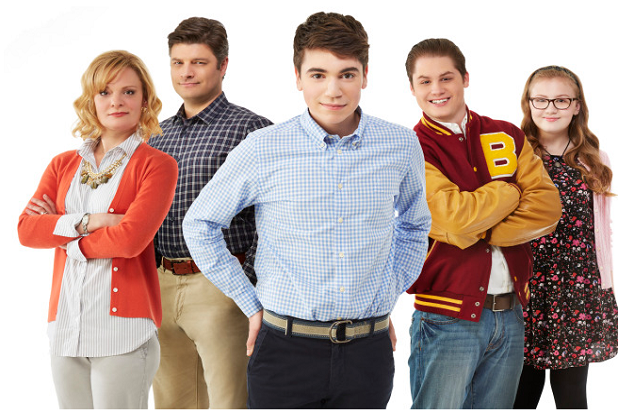


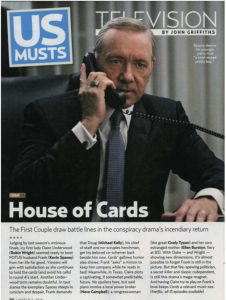
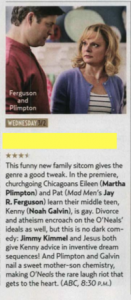
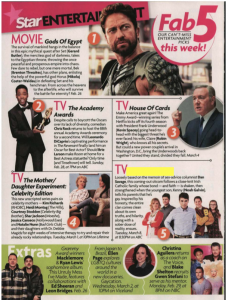

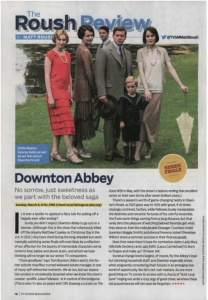
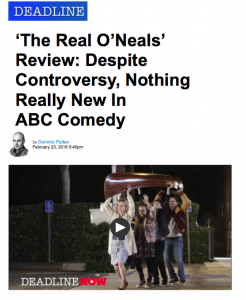
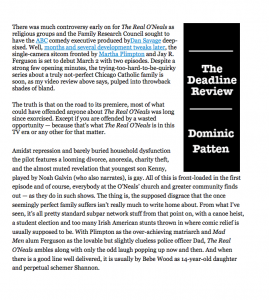

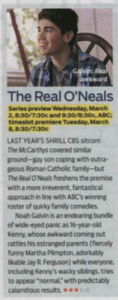
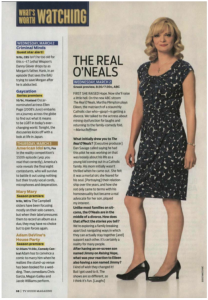


 There’s something sweetly old-fashioned about the premise of ABC’s latest family comedy, The Real O’Neals, in which the an image-obsessed Catholic mom desperately attempts to hide her family’s foibles — and her teenage son’s recent coming out — from public scrutiny.
There’s something sweetly old-fashioned about the premise of ABC’s latest family comedy, The Real O’Neals, in which the an image-obsessed Catholic mom desperately attempts to hide her family’s foibles — and her teenage son’s recent coming out — from public scrutiny. Plimpton makes brusque, conservative matriarch Eileen feel vividly real within minutes — and she’s helped tremendously by a script (by Don’t Trust the B—- and Galavant‘s Casey Johnson and David Windsor) that gives her great zingers like her horrified response to what she erroneously thinks is son Kenny’s first sexual experience: “Father Phil was here — in his collar!”
Plimpton makes brusque, conservative matriarch Eileen feel vividly real within minutes — and she’s helped tremendously by a script (by Don’t Trust the B—- and Galavant‘s Casey Johnson and David Windsor) that gives her great zingers like her horrified response to what she erroneously thinks is son Kenny’s first sexual experience: “Father Phil was here — in his collar!”
